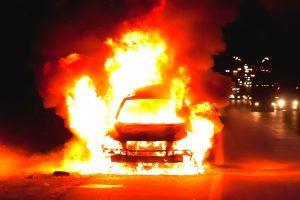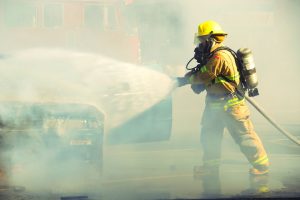Fort Myers Crash Lawyer Tips: What to Do If Your Car Catches Fire
 Car fires aren’t anywhere near as common as they used to be a few decades ago. However, as a Fort Myers crash lawyer, I’ve seen more than a few lead to serious injuries.
Car fires aren’t anywhere near as common as they used to be a few decades ago. However, as a Fort Myers crash lawyer, I’ve seen more than a few lead to serious injuries.
Thousands of vehicles have caught fire over the last decade – including at least a half a dozen electric vehicles that went up in flames in Southwest Florida following Hurricane Ian-related flooding. (Similar issues were also reported with golf carts and scooters post-storm – especially dangerous because unlike car fires caused by engine combustion, those involving compromised batteries can keep reigniting.)
Are Florida Vehicle Fires Truly That Big of a Problem?
Overall occurrences of vehicle fires have dropped by 60 percent since the 1980s, according to the National Fire Protection Association (NFPA). But whether the car is powered by gasoline, lithium-ion batteries, hybrid powertrains, or electricity – car fires are always a possibility after a crash. In a single recent year, the NFPA estimates there were more than 212,000 vehicle fires in the U.S., resulting in 1,500 injuries, 560 deaths, and nearly $2 billion in property damage. It breaks down to about 400 vehicle fires daily. Vehicle fires resulted in 4.5 times the number of deaths as non-residential structure fires and 1.6 times the number of apartment fire deaths. Fires involving vehicles account for 16 percent of the 1.3 million fires that get reported to fire departments annually, as well as 15 percent of fire-related deaths and 10 percent of fire-related injuries.
The vast majority of these are highway vehicle fires, the most common causes are:
- Mechanical failures & malfunctions
- Electrical failures & malfunctions
- Misuse of certain products or materials, such as spilling caustic liquids too close to the car
Older vehicles are especially prone to issues with flammability. When larger trucks are involved in a crash-related fire, the potential injury or death rate soars.
In some cases, vehicle manufacturers may be responsible for vehicle fires. For example, more than 7 million Kia and Hyundai vehicles have been recalled for vehicle fire risk, with more than 3,100 such fires (and 103 deaths) reported since 2010, according to the National Highway Traffic Safety Administration (NHTSA). It’s thought that perhaps these fires are related to the type of engine used by both car makers (they use many of the same parts suppliers), but it’s also possible faulty brake systems, wiring, and battery issues may be to blame. Where manufacturers haven’t been able to fix the fire risk right away, they’ve urged drivers to park the vehicles both outside and away from structures to minimize the odds of property damage if the vehicles do catch fire.
What Should I Do if My Car Catches Fire?

Per the Consumer Product Safety Commission, there are a few things you can do to try to prevent vehicle fires, including:
- Make routine vehicle maintenance a priority.
- Only transport gasoline (if you absolutely must) in small quantities, in sealed containers, in the trunk/trailer bed, with open windows/ventilation.
- Avoid parking your car in a place where flammable material (which can include grass or brush) might touch vehicle carriage components, such as the catalytic converter.
- Follow all manufacturer guidelines for charging your electric vehicle.
But what if your car is actively on fire? Best Fort Myers crash lawyer tips for staying safe:
- Get off the road and turn off the car as soon as possible. These may not always be possible in every scenario, but whenever you can: Getting off the road and cutting off the fuel access might significantly reduce the risk of injury.
- Get out and get away. Both you and passengers need to exit the vehicle as quickly and safely as possible. Put at least 100 feet of distance – more if possible – between yourselves and the vehicle, staying upwind if you can. If you’re near the road (especially the highway), keep away from traffic. Staying well behind the vehicle is usually safest so that if another vehicle strikes yours from behind, you are less at risk of also being struck.
- Call 911. If you don’t have access to your phone, try to flag down another motorist (only if safe) to call for emergency assistance.
- Keep the hood and trunk closed. This might increase the airflow, which could increase chances of the fire growing.
- Don’t try to put the fire out yourself. Unless you know the exact source of the fire, have the right kind of tools to extinguish the fire, know how to correctly use that tool, and you’re able to do so from a safe distance – better to leave it to the professionals. There’s a chance you may cause more harm than good if you try.
Can Car Makers Be Liable for Vehicle Fire Injuries, Deaths?
As a Fort Myers crash lawyer can explain, even if the fire isn’t the cause of the crash, the manufacturer can be held liable for the increased risk of injuries posed by the vehicle going up in flames. You may have been injured in that crash whether the vehicle caught fire or not – but the fire exacerbated your injuries, and product makers can be liable for that.
This would fall under a category of claims known as “product liability.”
The makers and distributors of the products (in this case, vehicles) can be liable (legally responsible) if the products cause unnecessary risk of injury and/or death to consumers who use those products. Defects in design or manufacturing or failure to warn consumers can be grounds for product liability claims.
If you are injured in a vehicle fire in Fort Myers, Port Charlotte, Sarasota, Cape Coral, Naples, or Key West, contact Garvin Injury Law at 800.977.7017 for a free consultation.
Additional Resources:
Why So Many Hyundai and Kia Vehicles Are Getting Recalled for Fire Risk, Dec. 6, 2022, By Keith Barry, Consumer Reports
More Blog Entries:
Can Both Drivers Be At-Fault in a Fort Myers Car Accident? Dec. 22, 2022, Fort Myers Crash Lawyer Blog





 Florida Personal Injury Lawyer Blog
Florida Personal Injury Lawyer Blog










